Agency Law Application: BSL165 Foundations of Business Law Case
VerifiedAdded on 2023/06/04
|7
|1733
|115
Case Study
AI Summary
This case study delves into various issues related to agency law, particularly focusing on the extent of an agent's authority and the principal's liability. It examines scenarios where an agent acts within and beyond their given authority, discussing the implications of actual versus ostensible authority. The analysis incorporates legal principles such as the doctrine of indoor management and relevant case laws like Freeman & Lockyer v Buckhurst Park Properties and Royal British Bank v Turquand. The study addresses questions regarding the enforceability of contracts entered into by agents, the potential liability of both the agent and the principal, and the rights of third parties dealing with agents. The conclusion emphasizes the importance of understanding the scope of authority and the good faith of third parties in determining liability within agency relationships. Desklib offers similar solved assignments and study resources for students.
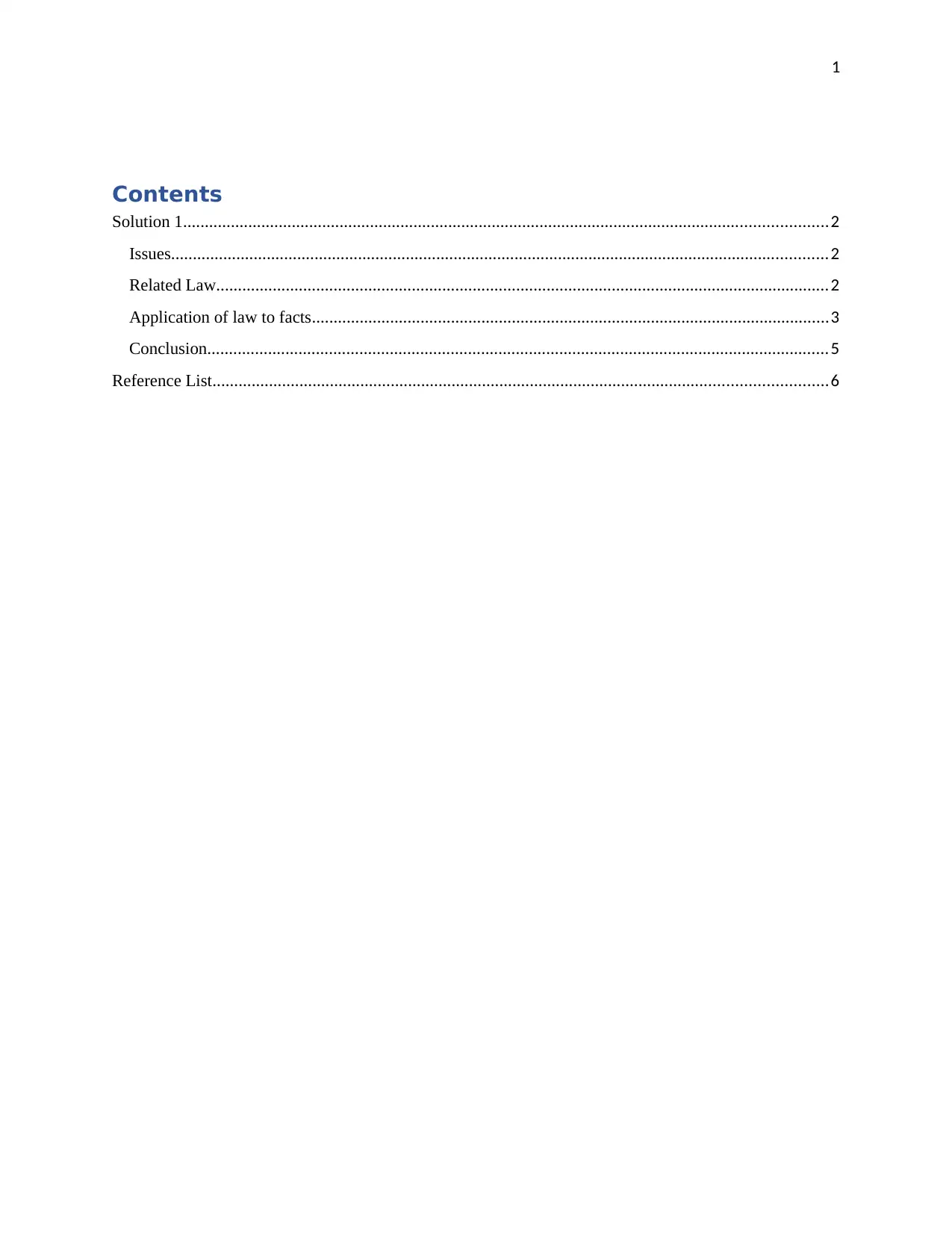
1
Contents
Solution 1....................................................................................................................................................2
Issues.......................................................................................................................................................2
Related Law.............................................................................................................................................2
Application of law to facts.......................................................................................................................3
Conclusion...............................................................................................................................................5
Reference List.............................................................................................................................................6
Contents
Solution 1....................................................................................................................................................2
Issues.......................................................................................................................................................2
Related Law.............................................................................................................................................2
Application of law to facts.......................................................................................................................3
Conclusion...............................................................................................................................................5
Reference List.............................................................................................................................................6
Paraphrase This Document
Need a fresh take? Get an instant paraphrase of this document with our AI Paraphraser
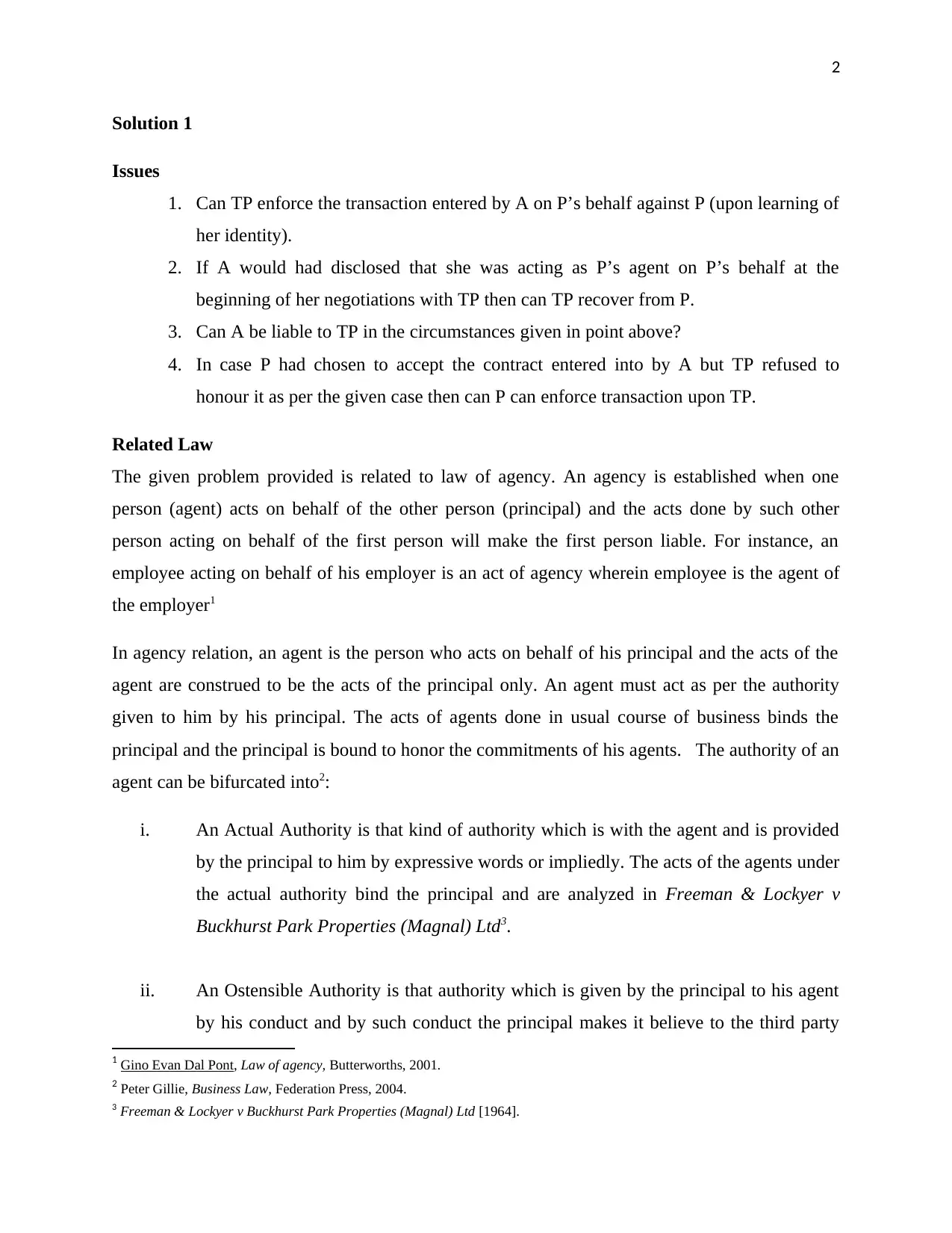
2
Solution 1
Issues
1. Can TP enforce the transaction entered by A on P’s behalf against P (upon learning of
her identity).
2. If A would had disclosed that she was acting as P’s agent on P’s behalf at the
beginning of her negotiations with TP then can TP recover from P.
3. Can A be liable to TP in the circumstances given in point above?
4. In case P had chosen to accept the contract entered into by A but TP refused to
honour it as per the given case then can P can enforce transaction upon TP.
Related Law
The given problem provided is related to law of agency. An agency is established when one
person (agent) acts on behalf of the other person (principal) and the acts done by such other
person acting on behalf of the first person will make the first person liable. For instance, an
employee acting on behalf of his employer is an act of agency wherein employee is the agent of
the employer1
In agency relation, an agent is the person who acts on behalf of his principal and the acts of the
agent are construed to be the acts of the principal only. An agent must act as per the authority
given to him by his principal. The acts of agents done in usual course of business binds the
principal and the principal is bound to honor the commitments of his agents. The authority of an
agent can be bifurcated into2:
i. An Actual Authority is that kind of authority which is with the agent and is provided
by the principal to him by expressive words or impliedly. The acts of the agents under
the actual authority bind the principal and are analyzed in Freeman & Lockyer v
Buckhurst Park Properties (Magnal) Ltd3.
ii. An Ostensible Authority is that authority which is given by the principal to his agent
by his conduct and by such conduct the principal makes it believe to the third party
1 Gino Evan Dal Pont, Law of agency, Butterworths, 2001.
2 Peter Gillie, Business Law, Federation Press, 2004.
3 Freeman & Lockyer v Buckhurst Park Properties (Magnal) Ltd [1964].
Solution 1
Issues
1. Can TP enforce the transaction entered by A on P’s behalf against P (upon learning of
her identity).
2. If A would had disclosed that she was acting as P’s agent on P’s behalf at the
beginning of her negotiations with TP then can TP recover from P.
3. Can A be liable to TP in the circumstances given in point above?
4. In case P had chosen to accept the contract entered into by A but TP refused to
honour it as per the given case then can P can enforce transaction upon TP.
Related Law
The given problem provided is related to law of agency. An agency is established when one
person (agent) acts on behalf of the other person (principal) and the acts done by such other
person acting on behalf of the first person will make the first person liable. For instance, an
employee acting on behalf of his employer is an act of agency wherein employee is the agent of
the employer1
In agency relation, an agent is the person who acts on behalf of his principal and the acts of the
agent are construed to be the acts of the principal only. An agent must act as per the authority
given to him by his principal. The acts of agents done in usual course of business binds the
principal and the principal is bound to honor the commitments of his agents. The authority of an
agent can be bifurcated into2:
i. An Actual Authority is that kind of authority which is with the agent and is provided
by the principal to him by expressive words or impliedly. The acts of the agents under
the actual authority bind the principal and are analyzed in Freeman & Lockyer v
Buckhurst Park Properties (Magnal) Ltd3.
ii. An Ostensible Authority is that authority which is given by the principal to his agent
by his conduct and by such conduct the principal makes it believe to the third party
1 Gino Evan Dal Pont, Law of agency, Butterworths, 2001.
2 Peter Gillie, Business Law, Federation Press, 2004.
3 Freeman & Lockyer v Buckhurst Park Properties (Magnal) Ltd [1964].
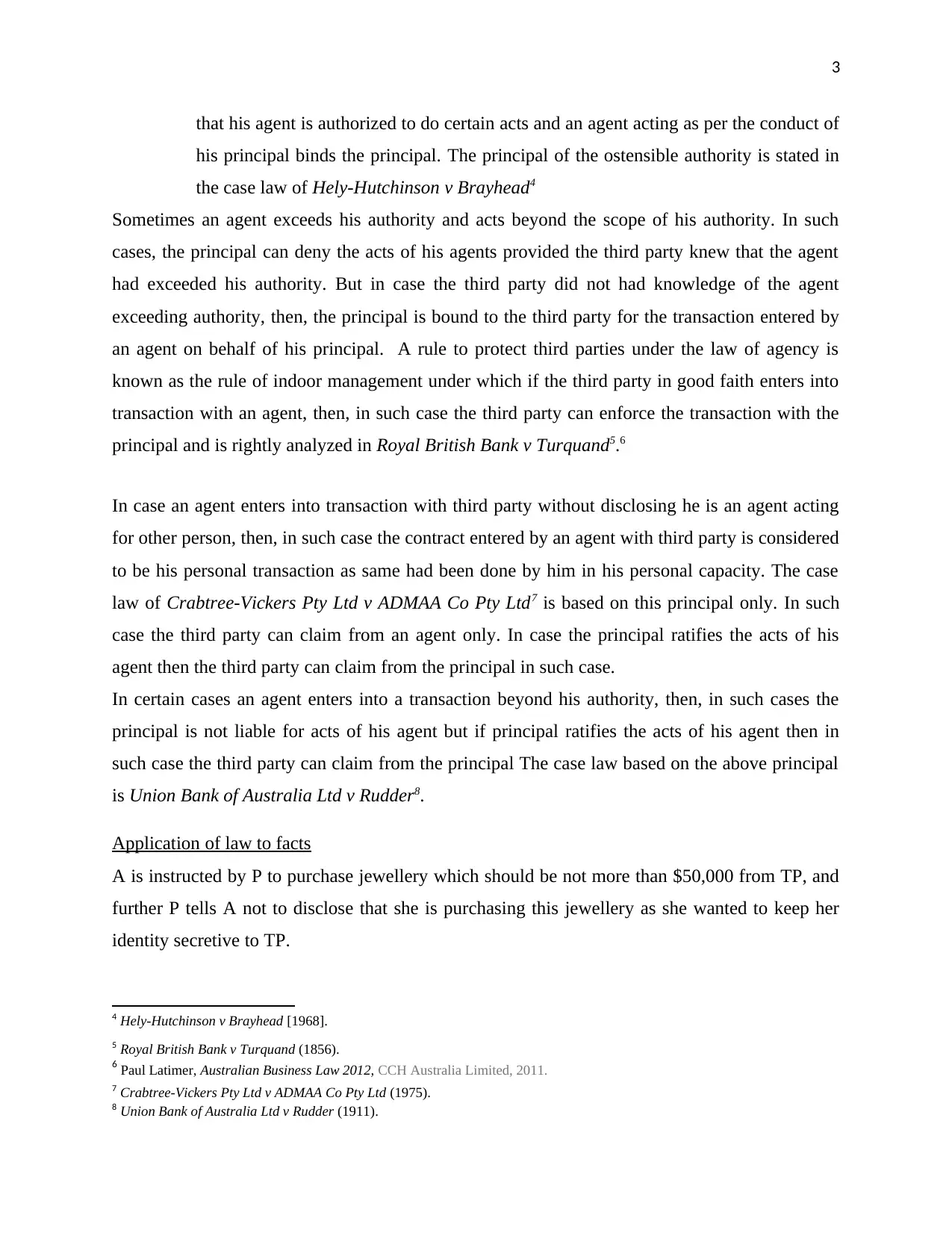
3
that his agent is authorized to do certain acts and an agent acting as per the conduct of
his principal binds the principal. The principal of the ostensible authority is stated in
the case law of Hely-Hutchinson v Brayhead4
Sometimes an agent exceeds his authority and acts beyond the scope of his authority. In such
cases, the principal can deny the acts of his agents provided the third party knew that the agent
had exceeded his authority. But in case the third party did not had knowledge of the agent
exceeding authority, then, the principal is bound to the third party for the transaction entered by
an agent on behalf of his principal. A rule to protect third parties under the law of agency is
known as the rule of indoor management under which if the third party in good faith enters into
transaction with an agent, then, in such case the third party can enforce the transaction with the
principal and is rightly analyzed in Royal British Bank v Turquand5.6
In case an agent enters into transaction with third party without disclosing he is an agent acting
for other person, then, in such case the contract entered by an agent with third party is considered
to be his personal transaction as same had been done by him in his personal capacity. The case
law of Crabtree-Vickers Pty Ltd v ADMAA Co Pty Ltd7 is based on this principal only. In such
case the third party can claim from an agent only. In case the principal ratifies the acts of his
agent then the third party can claim from the principal in such case.
In certain cases an agent enters into a transaction beyond his authority, then, in such cases the
principal is not liable for acts of his agent but if principal ratifies the acts of his agent then in
such case the third party can claim from the principal The case law based on the above principal
is Union Bank of Australia Ltd v Rudder8.
Application of law to facts
A is instructed by P to purchase jewellery which should be not more than $50,000 from TP, and
further P tells A not to disclose that she is purchasing this jewellery as she wanted to keep her
identity secretive to TP.
4 Hely-Hutchinson v Brayhead [1968].
5 Royal British Bank v Turquand (1856).
6 Paul Latimer, Australian Business Law 2012, CCH Australia Limited, 2011.
7 Crabtree-Vickers Pty Ltd v ADMAA Co Pty Ltd (1975).
8 Union Bank of Australia Ltd v Rudder (1911).
that his agent is authorized to do certain acts and an agent acting as per the conduct of
his principal binds the principal. The principal of the ostensible authority is stated in
the case law of Hely-Hutchinson v Brayhead4
Sometimes an agent exceeds his authority and acts beyond the scope of his authority. In such
cases, the principal can deny the acts of his agents provided the third party knew that the agent
had exceeded his authority. But in case the third party did not had knowledge of the agent
exceeding authority, then, the principal is bound to the third party for the transaction entered by
an agent on behalf of his principal. A rule to protect third parties under the law of agency is
known as the rule of indoor management under which if the third party in good faith enters into
transaction with an agent, then, in such case the third party can enforce the transaction with the
principal and is rightly analyzed in Royal British Bank v Turquand5.6
In case an agent enters into transaction with third party without disclosing he is an agent acting
for other person, then, in such case the contract entered by an agent with third party is considered
to be his personal transaction as same had been done by him in his personal capacity. The case
law of Crabtree-Vickers Pty Ltd v ADMAA Co Pty Ltd7 is based on this principal only. In such
case the third party can claim from an agent only. In case the principal ratifies the acts of his
agent then the third party can claim from the principal in such case.
In certain cases an agent enters into a transaction beyond his authority, then, in such cases the
principal is not liable for acts of his agent but if principal ratifies the acts of his agent then in
such case the third party can claim from the principal The case law based on the above principal
is Union Bank of Australia Ltd v Rudder8.
Application of law to facts
A is instructed by P to purchase jewellery which should be not more than $50,000 from TP, and
further P tells A not to disclose that she is purchasing this jewellery as she wanted to keep her
identity secretive to TP.
4 Hely-Hutchinson v Brayhead [1968].
5 Royal British Bank v Turquand (1856).
6 Paul Latimer, Australian Business Law 2012, CCH Australia Limited, 2011.
7 Crabtree-Vickers Pty Ltd v ADMAA Co Pty Ltd (1975).
8 Union Bank of Australia Ltd v Rudder (1911).
⊘ This is a preview!⊘
Do you want full access?
Subscribe today to unlock all pages.

Trusted by 1+ million students worldwide
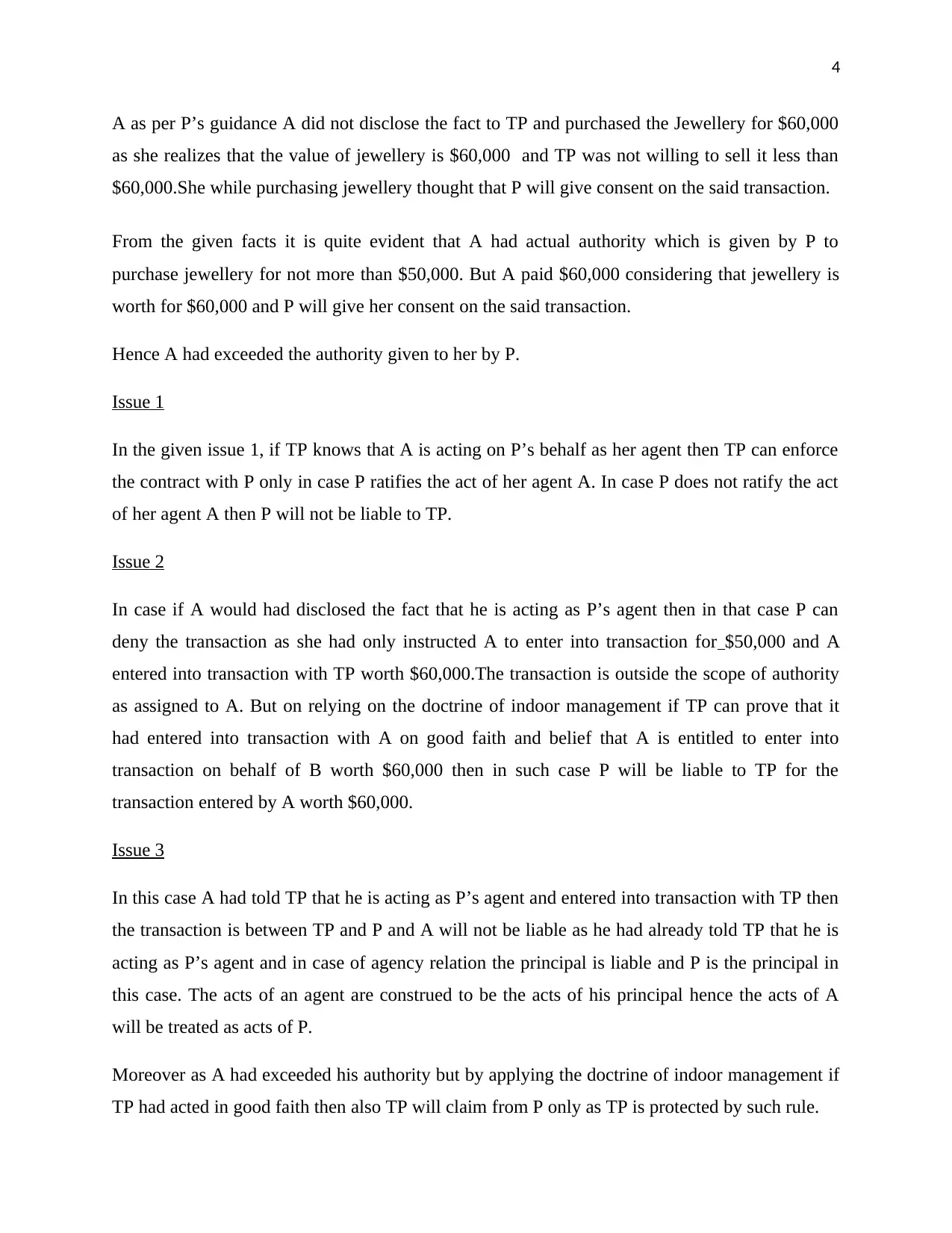
4
A as per P’s guidance A did not disclose the fact to TP and purchased the Jewellery for $60,000
as she realizes that the value of jewellery is $60,000 and TP was not willing to sell it less than
$60,000.She while purchasing jewellery thought that P will give consent on the said transaction.
From the given facts it is quite evident that A had actual authority which is given by P to
purchase jewellery for not more than $50,000. But A paid $60,000 considering that jewellery is
worth for $60,000 and P will give her consent on the said transaction.
Hence A had exceeded the authority given to her by P.
Issue 1
In the given issue 1, if TP knows that A is acting on P’s behalf as her agent then TP can enforce
the contract with P only in case P ratifies the act of her agent A. In case P does not ratify the act
of her agent A then P will not be liable to TP.
Issue 2
In case if A would had disclosed the fact that he is acting as P’s agent then in that case P can
deny the transaction as she had only instructed A to enter into transaction for $50,000 and A
entered into transaction with TP worth $60,000.The transaction is outside the scope of authority
as assigned to A. But on relying on the doctrine of indoor management if TP can prove that it
had entered into transaction with A on good faith and belief that A is entitled to enter into
transaction on behalf of B worth $60,000 then in such case P will be liable to TP for the
transaction entered by A worth $60,000.
Issue 3
In this case A had told TP that he is acting as P’s agent and entered into transaction with TP then
the transaction is between TP and P and A will not be liable as he had already told TP that he is
acting as P’s agent and in case of agency relation the principal is liable and P is the principal in
this case. The acts of an agent are construed to be the acts of his principal hence the acts of A
will be treated as acts of P.
Moreover as A had exceeded his authority but by applying the doctrine of indoor management if
TP had acted in good faith then also TP will claim from P only as TP is protected by such rule.
A as per P’s guidance A did not disclose the fact to TP and purchased the Jewellery for $60,000
as she realizes that the value of jewellery is $60,000 and TP was not willing to sell it less than
$60,000.She while purchasing jewellery thought that P will give consent on the said transaction.
From the given facts it is quite evident that A had actual authority which is given by P to
purchase jewellery for not more than $50,000. But A paid $60,000 considering that jewellery is
worth for $60,000 and P will give her consent on the said transaction.
Hence A had exceeded the authority given to her by P.
Issue 1
In the given issue 1, if TP knows that A is acting on P’s behalf as her agent then TP can enforce
the contract with P only in case P ratifies the act of her agent A. In case P does not ratify the act
of her agent A then P will not be liable to TP.
Issue 2
In case if A would had disclosed the fact that he is acting as P’s agent then in that case P can
deny the transaction as she had only instructed A to enter into transaction for $50,000 and A
entered into transaction with TP worth $60,000.The transaction is outside the scope of authority
as assigned to A. But on relying on the doctrine of indoor management if TP can prove that it
had entered into transaction with A on good faith and belief that A is entitled to enter into
transaction on behalf of B worth $60,000 then in such case P will be liable to TP for the
transaction entered by A worth $60,000.
Issue 3
In this case A had told TP that he is acting as P’s agent and entered into transaction with TP then
the transaction is between TP and P and A will not be liable as he had already told TP that he is
acting as P’s agent and in case of agency relation the principal is liable and P is the principal in
this case. The acts of an agent are construed to be the acts of his principal hence the acts of A
will be treated as acts of P.
Moreover as A had exceeded his authority but by applying the doctrine of indoor management if
TP had acted in good faith then also TP will claim from P only as TP is protected by such rule.
Paraphrase This Document
Need a fresh take? Get an instant paraphrase of this document with our AI Paraphraser
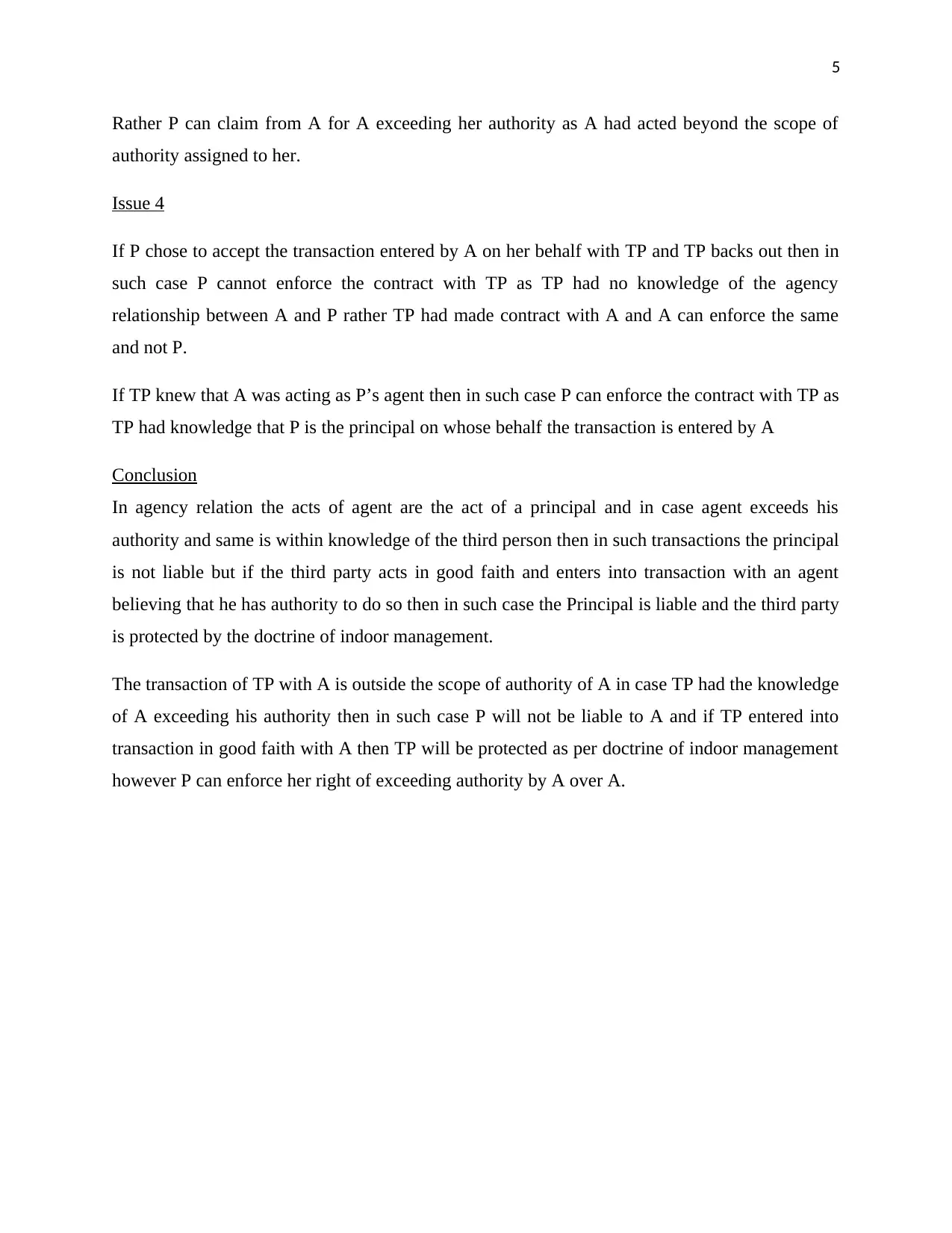
5
Rather P can claim from A for A exceeding her authority as A had acted beyond the scope of
authority assigned to her.
Issue 4
If P chose to accept the transaction entered by A on her behalf with TP and TP backs out then in
such case P cannot enforce the contract with TP as TP had no knowledge of the agency
relationship between A and P rather TP had made contract with A and A can enforce the same
and not P.
If TP knew that A was acting as P’s agent then in such case P can enforce the contract with TP as
TP had knowledge that P is the principal on whose behalf the transaction is entered by A
Conclusion
In agency relation the acts of agent are the act of a principal and in case agent exceeds his
authority and same is within knowledge of the third person then in such transactions the principal
is not liable but if the third party acts in good faith and enters into transaction with an agent
believing that he has authority to do so then in such case the Principal is liable and the third party
is protected by the doctrine of indoor management.
The transaction of TP with A is outside the scope of authority of A in case TP had the knowledge
of A exceeding his authority then in such case P will not be liable to A and if TP entered into
transaction in good faith with A then TP will be protected as per doctrine of indoor management
however P can enforce her right of exceeding authority by A over A.
Rather P can claim from A for A exceeding her authority as A had acted beyond the scope of
authority assigned to her.
Issue 4
If P chose to accept the transaction entered by A on her behalf with TP and TP backs out then in
such case P cannot enforce the contract with TP as TP had no knowledge of the agency
relationship between A and P rather TP had made contract with A and A can enforce the same
and not P.
If TP knew that A was acting as P’s agent then in such case P can enforce the contract with TP as
TP had knowledge that P is the principal on whose behalf the transaction is entered by A
Conclusion
In agency relation the acts of agent are the act of a principal and in case agent exceeds his
authority and same is within knowledge of the third person then in such transactions the principal
is not liable but if the third party acts in good faith and enters into transaction with an agent
believing that he has authority to do so then in such case the Principal is liable and the third party
is protected by the doctrine of indoor management.
The transaction of TP with A is outside the scope of authority of A in case TP had the knowledge
of A exceeding his authority then in such case P will not be liable to A and if TP entered into
transaction in good faith with A then TP will be protected as per doctrine of indoor management
however P can enforce her right of exceeding authority by A over A.
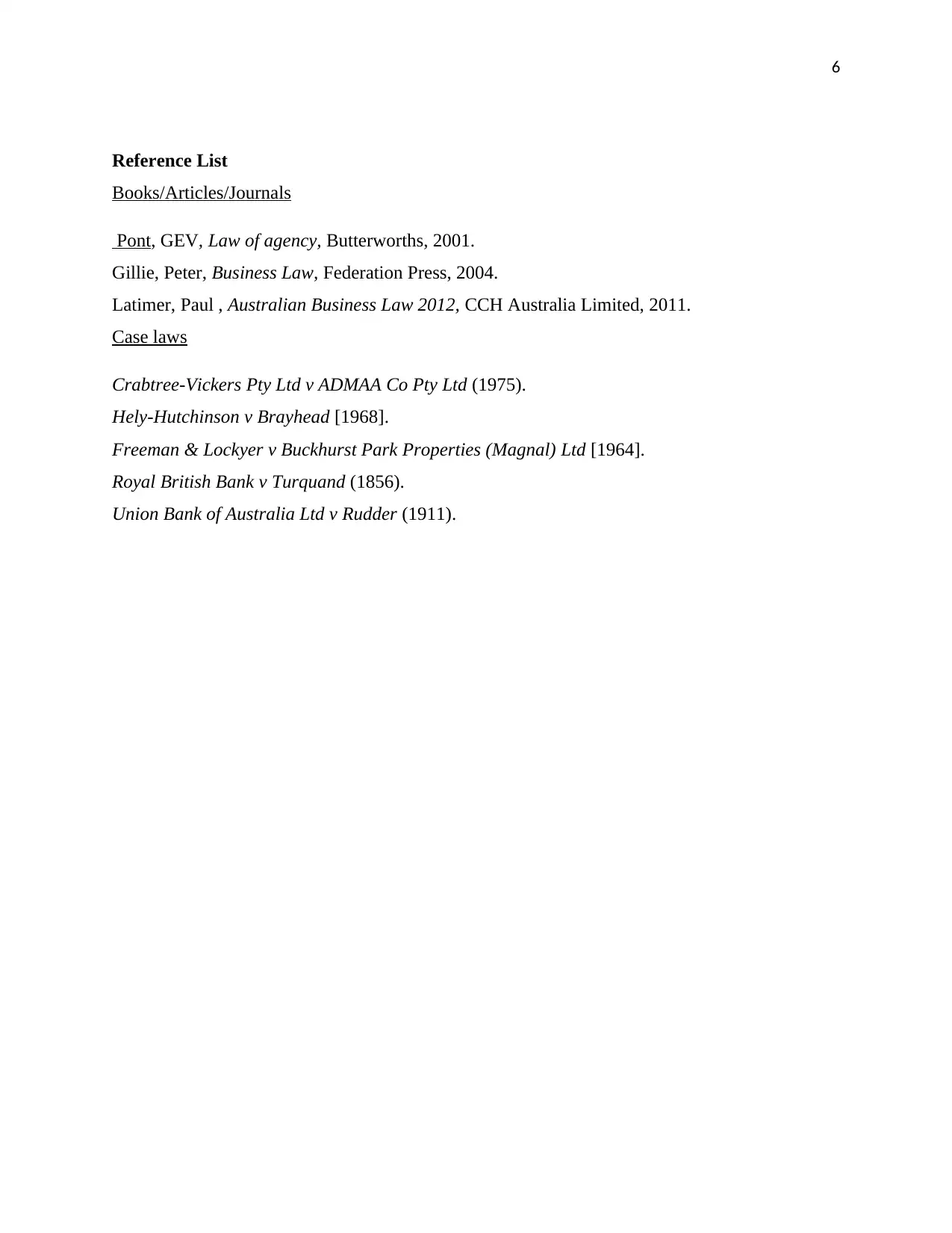
6
Reference List
Books/Articles/Journals
Pont, GEV, Law of agency, Butterworths, 2001.
Gillie, Peter, Business Law, Federation Press, 2004.
Latimer, Paul , Australian Business Law 2012, CCH Australia Limited, 2011.
Case laws
Crabtree-Vickers Pty Ltd v ADMAA Co Pty Ltd (1975).
Hely-Hutchinson v Brayhead [1968].
Freeman & Lockyer v Buckhurst Park Properties (Magnal) Ltd [1964].
Royal British Bank v Turquand (1856).
Union Bank of Australia Ltd v Rudder (1911).
Reference List
Books/Articles/Journals
Pont, GEV, Law of agency, Butterworths, 2001.
Gillie, Peter, Business Law, Federation Press, 2004.
Latimer, Paul , Australian Business Law 2012, CCH Australia Limited, 2011.
Case laws
Crabtree-Vickers Pty Ltd v ADMAA Co Pty Ltd (1975).
Hely-Hutchinson v Brayhead [1968].
Freeman & Lockyer v Buckhurst Park Properties (Magnal) Ltd [1964].
Royal British Bank v Turquand (1856).
Union Bank of Australia Ltd v Rudder (1911).
⊘ This is a preview!⊘
Do you want full access?
Subscribe today to unlock all pages.

Trusted by 1+ million students worldwide

7
1 out of 7
Related Documents
Your All-in-One AI-Powered Toolkit for Academic Success.
+13062052269
info@desklib.com
Available 24*7 on WhatsApp / Email
![[object Object]](/_next/static/media/star-bottom.7253800d.svg)
Unlock your academic potential
Copyright © 2020–2026 A2Z Services. All Rights Reserved. Developed and managed by ZUCOL.





